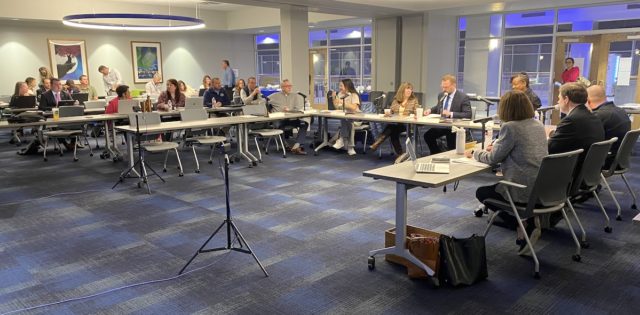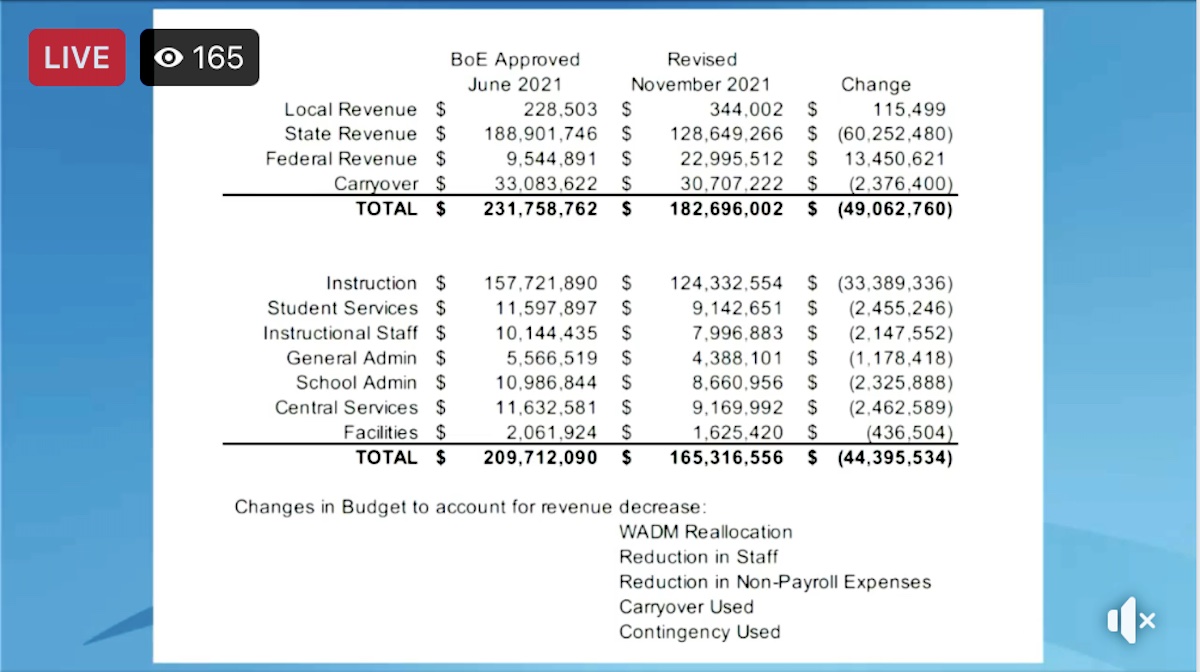
Three out of five students that enrolled in Epic Charter Schools during the height of the pandemic last year returned to their home districts for the 2021-2022 school year. The shift marks an enrollment decline that is expected to cause a $60 million drop in state-allocated funding as well as staff cuts for the charter schools.
The “reduction in force” was a point of discussion for Epic board members at Wednesday evening’s meeting, along with the approval of revised fiscal year 2022 general fund budgets for Epic One-on-One and Epic Blended. Called Community Strategies, the Epic board also approved a motion that will implement term limits for its members.
“We simply do not need and cannot afford to be staffed for 61,000 kids when our enrollment has begun to even out post-pandemic,” Epic Superintendent Bart Banfield said in a press release Tuesday.
While enrollment for the charter schools skyrocketed to 61,000 students for the 2020-2021 school year, the charter schools are sitting at just above 38,000 students for the current school year.
During Wednesday’s meetings, which took place consecutively, Banfield informed board members that, as of Nov. 15, Epic One-on-One’s student enrollment is 23,839. The enrollment for Epic Blended is 15,579 students.
Epic began “right-sizing” operations last week, and staff cuts will continue throughout November, board members were told. However, Banfield did not specify how many of Epic’s 1,988 employees would be terminated. There are currently 1,494 employees that provide direct support to students and families, plus 494 employees filling non-instructional positions.
In his press statement, Banfield said his goal is to provide the least amount of disruption to students while protecting as many employees as possible.
“We are right-sizing our operations so we can continue to serve students and families,” Banfield said. “While these are difficult decisions, our responsibility is to serve kids first. This is a painful process, but in the long-term, we’re building stability and viability into our organization.”
Budget decrease for Epic One-on-One, increase for Epic Blended

Deputy Superintendent of Finance Janice Wynn presented a revised FY22 budget for Epic One-on-One that accounts for the revenue decrease. The revision was approved by board members.
“All of our funding is tied to our student count,” Wynn said. “As of today, where we stand, I’m asking for your approval to decrease our budget from $209,712,090 to $165,316,446.”
Board members also approved a revised budget for Epic Blended, which will see an increase of $14,380,355 despite falling enrollment, owing mostly to an approximate $12.2 million increase in federal funds.
During the meeting, board member Kathrine Steno said she was “concerned” about how the “reduction in force” began, including that she felt it happened suddenly.
“As a board member, I had no idea that we were doing it at all and so suddenly,” Steno said. “I was very concerned about how this happened.”
Banfield told Steno that when Epic entered the fiscal year starting July 1, he was unsure of what enrollment would look like and that he made the decision in order to be proactive. Still, he called the process “painful.”
Board Chairman Paul Campbell said he was surprised by the fact that Steno was surprised by the cuts.
“I feel very confident that this has been well thought through, and I’m surprised you’re surprised, to be honest with you, because [Banfield] has talked about this at board meetings,” Campbell said. “This isn’t a surprise by any stretch of the imagination to this board.”
Steno said she thought communication about the issue could have been better and that she would have liked to be in the loop before reading about the plan in news reports.
Despite calming instrumental versions of Take on Me and Let’s Hear it For the Boy played in the room prior to the start of Wednesday’s board meeting, Campbell expressed some frustration over the press release about the staff reduction that was sent out Tuesday afternoon.
“I don’t think the press release was needed,” Campbell said during the meeting. “Our communications team (and) our communications strategy is centered around what’s in the best interest of students. I don’t care what the Tulsa World or The Oklahoman think, no offense to them. We’re here to run a school. If you want to do a press release on the fact that (when) our graduation rates are finally at 80 percent — OK, maybe. But the inner workings of the school and the stuff we’ve got going on, those days are over. This media game that we played in the past to gaslight everyone is over.”
Board members approve term limits
During the meeting, board members also approved a motion to place themselves under term limits. Banfield said the move is part of the settlement agreement with Oklahoma’s Statewide Virtual Charter School Board.
“Technically, right now, because we don’t have that in place, we are not in compliance with that agreement,” Banfield said. “In order for us to come 100 percent into compliance with that agreement they would like to see, and I think it’s a best practice as well — where we have this constant cycle on an annual basis for board members to come onto the board and also for board members to step off of the board.”
Campbell said he would have discussions with each board member to determine who will serve a one-year, two-year and three-year term, with future board members brought to the Epic board for consideration.
“I make a motion that the chair of this board will decide the term for each board member initially,” board member Ginger Casper said.
Board members also entered executive session to discuss Epic Youth Services, Epic’s former and controversial management company with which board members severed ties in May, as well as compliance with the SVCSB’s settlement agreement. However, no action was taken after executive session.





















